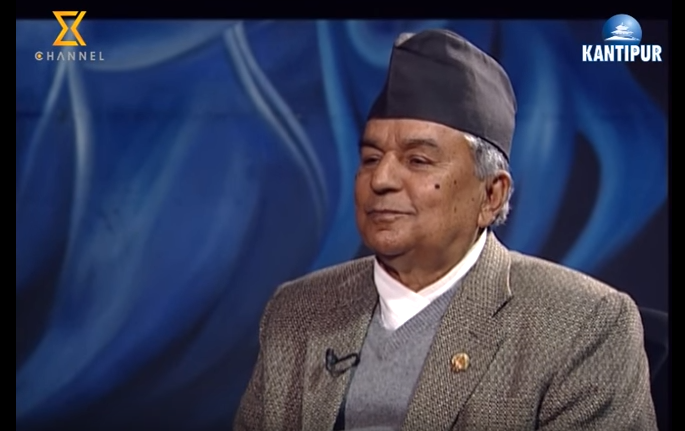New constitution has indeed removed some provisions of the Interim Constitution
Sujit Mainali / January 21, 2016

Nepali Congress Vice Chairman and former Deputy Prime Minister Ram Chandra Paudel has claimed that the new constitution has not reversed any of the provisions of the Interim Constitution 2007.
During a recent interview with Kantipur Television, when the interviewer asked him about the allegation from the Madhes-based parties that the new constitution has nullified the rights guaranteed by some provisions of the Interim Constitution, Paudel flatly replied: “No provision of the interim constitution has been reversed by the new constitution.”
Click here to see the interview.
South Asia Check compared the two constitutions and found that some provisions of the Interim Constitution have indeed been removed in the new constitution.
Some of those reversed provisions are:
- Interim Constitution’s Article 21 under the heading “Right to Social Justice” states that “Women, Dalits, indigenous nationalities, Madhesi community, oppressed groups, poor farmers and the laborers who are economically, socially or educationally backward, shall have the right to participate in the state structures on the basis of the principle of proportional inclusion.”
Article 42 of the new constitution under the heading “Right to Social Justice” has stated that the aforementioned marginalized people shall have the right to “participate in the state structure on the basis of the principle of inclusion.”
The term “principle of the proportional inclusion” mentioned in the interim constitution has been replaced by the phrase “principle of inclusion” in the new constitution.
But still, the preamble of the new constitution states that the constitution is ‘determined to creating an egalitarian society based on the principle of proportional inclusion and participation.”
- Article 63 (3) of the Interim Constitution has stated that the Constituent Assembly members will be elected and nominated “on the basis of the equality of population, geographical congeniality and specificity, and on the basis of the percentage of the population in Madhes.”
Clause 1 (A) of Article 84 of the new constitution has stated that in the first-past-the-post election of the members of the parliament, the electoral constituencies will be fixed “on the basis geography and population.”
Clause 2 of the same Article has further mentioned that the political parties while fielding candidates for members of parliament under the proportional electoral system should also be mindful of the geographical and provincial balance.
Here, the separate yardstick for the election and nomination of the members of the parliament and Constituent Assembly from Tarai mentioned in the interim constitution has been removed in the new constitution.
- Article 8 (5) of the Interim Constitution has stated that “people who were born within Nepali territory by April 13, 1990 (Chaitra of 2046 BS) and who is permanently domiciled in Nepal will get citizenship by birth on the basis of the existing law.”
However, the new constitution does not mention any such cutoff date.
- Article 155 of the Interim Constitution has mentioned that “in order to be eligible for appointment to constitutional positions in accordance with this constitution, a person must be a citizen of Nepal by descent or birth or naturalization and has lived in Nepal for at least 10 years.”
But the new constitution has restricted some topmost posts of the state for naturalized citizens.
Article 289 (1) of the new constitution has stated that “in order for a person to be elected, nominated or appointed as president, vice-president, prime minister, chief justice, speaker of parliament, chairperson of the national assembly, head of province, chief minister, speaker of provincial assembly and chief of security bodies, the person must have obtained Nepali citizenship by descent.”
Clause (2) of the new constitution has further mentioned that the candidate with Nepali citizenship by descent or birth or naturalization is qualified for other posts of the constitutional bodies. For this, the candidate with naturalized citizenship must have lived in Nepal for at least ten years. But those with citizenship by birth or women with matrimonial naturalized citizenship are qualified for the other positions in constitutional bodies if they have lived in Nepal for not less than five years.
This material is copyrighted but may be used for any purpose by giving due credit to southasiacheck.org.
Comments
Latest Stories
- In Public Interest Covid-19 cases are low, but that’s not an excuse to avoid vaccination
- In Public Interest What is BF.7, the sub-variant that has the world by its grip?
- In Public Interest Threat of a new Covid-19 wave looms large amid vaccine shortage in Nepal
- In Public Interest As cases decline, Covid-19 test centres in Kathmandu are desolate lot
- In Public Interest Dengue test fee disparity has patients wondering if they’re being cheated
- In Public Interest As dengue rages on, confusion galore about what it is and what its symptoms are. Here’s what you need to know
In Public Interest
 Covid-19 cases are low, but that’s not an excuse to avoid vaccination
The Pfizer-BioNTech bivalent vaccines authorised by the Nepal Government provide better protection a...
Read More
Covid-19 cases are low, but that’s not an excuse to avoid vaccination
The Pfizer-BioNTech bivalent vaccines authorised by the Nepal Government provide better protection a...
Read More
- What is BF.7, the sub-variant that has the world by its grip?
- Threat of a new Covid-19 wave looms large amid vaccine shortage in Nepal
- As cases decline, Covid-19 test centres in Kathmandu are desolate lot
- Dengue test fee disparity has patients wondering if they’re being cheated
- As dengue rages on, confusion galore about what it is and what its symptoms are. Here’s what you need to know